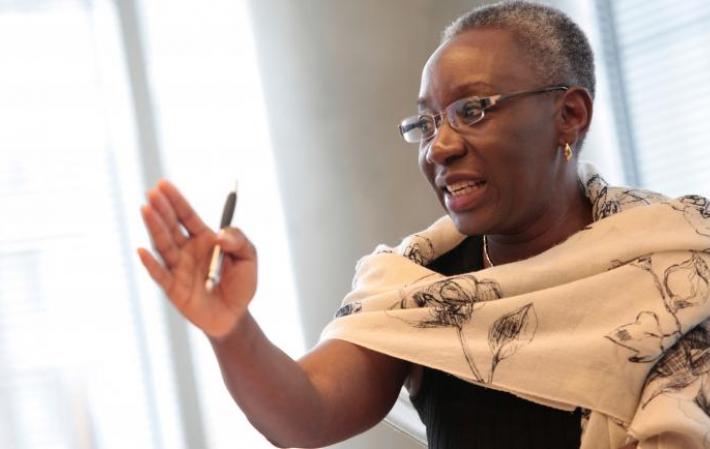
Sandra Pepera, Senior Associate and Director for NDI's Gender, Women and Democracy team.
.jpg)
Environmental activist from Macedonia talks with a voter about campaign to clean up pollution sites ahead of the 2013 mayoral elections.
Elections are often treated by donors and development practitioners as discrete events that require process-oriented support; like ensuring registration, campaigning, voting and vote counting standards are met. There has been much less emphasis on putting elections to work to advance the collective socio-economic interests of citizens. Financial or technical support to strengthen an election process may result in one that is more inclusive and fair, but even the most credible elections do not guarantee a government that will address citizen needs.
Recently, NDI undertook a review of programs that show how elections can advance the collective interests of citizens. We compiled lessons from NDI programs in Malawi, Macedonia and Turkey to demonstrate the value of taking advantage of election periods during strategic campaigns. Our new website, Putting Elections to Work for Accountability, compiles the findings of the review and features case studies of campaigns in Malawi, Macedonia and Turkey. The
.jpg)
Philadelphia skyline at night. Credit: Flickr user Tyler Sprague (CC BY-NC)
Every four years NDI has the honor of hosting the International Leaders Forum (#ILF2016) -- a week-long series of non-partisan events for international leaders organized around the Democratic National Convention. The convention is held by the U.S. Democratic Party to nominate a presidential and vice presidential candidate. The Forum -- held in Philadelphia, Pennsylvania, this year -- carries on NDI’s tradition of bringing together international leaders to experience the convention and to learn about the U.S. political system. Nearly 400 current and former heads of government, ambassadors, cabinet ministers, parliamentarians, and leaders of political parties from over 100 countries will participate.
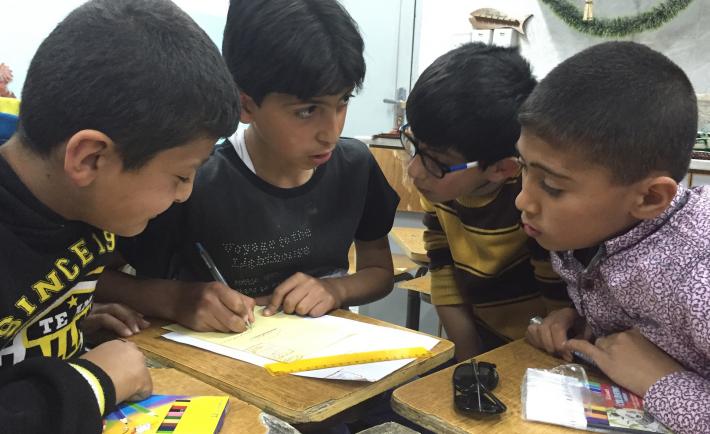
150 schools in Jordan are implementing NDI’s Youth Political Participation Program (Ana Usharek Schools) involving 3,053 students across Jordan. The program aims to promote civic education among students, involve them in projects serving their communities and introduce ways to effectively participate in political and public life. Photo Credit: Dareen Al-khoury
Each week NDI’s Citizen Participation team provides a resource to assist NDI staff in meeting the objectives of their programs. The past month’s resources discussed the need to better understand the thinking and working politically (TWP) framework in development programming, described the importance of integrating politics into development efforts to improve service delivery for poor populations, introduced a research and advocacy framework to support community organizing, and shared effective strategies to improve social accountability approaches. These resources provide tools and insights that can equip citizens and civil society with politically informed approaches to achieve better development outcomes and facilitate positive change.
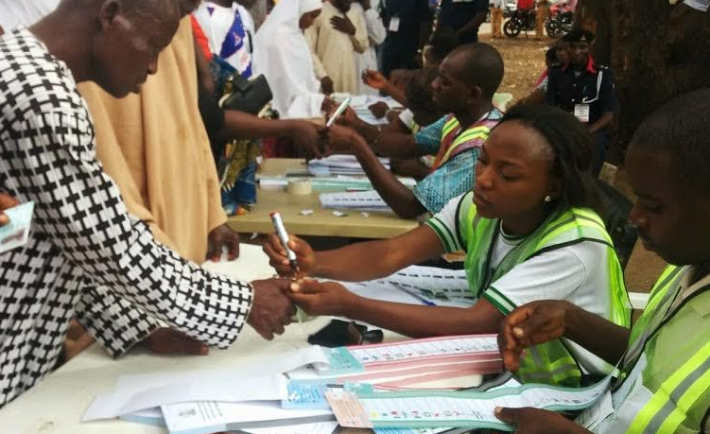
A female election official in Nigeria marks the thumb of a voter on election day in 2015 to help prevent double voting.
For the first time in history, over half the world’s population lives under elected governments. Yet, even in the most established democracies, women continue to be widely under-represented as voters, political leaders and elected officials. As half the world’s population, women are a key part of any democracy and their full and equal participation is a human right, and a measure of democratic integrity. Furthermore, we now have evidence of the positive effects of women’s participation. This can be seen in peace processes, where women’s involvement in peace negotiations means that the settlements are 35 percent more likely to last at least 15 years. Equally, a study that tracked women’s increased participation in local councils in India, showed that more women councillors led to increased investment in public services such as water and roads, improved parents’ aspirations for their daughters, and “erased” the gap between the boys’ and girls’ educational achievements.
On Monday, the National Democratic Institute (NDI) joined the Bitfury Group and New America to launch the Blockchain Trust Accelerator, which will work to connect governments with the technologists and resources needed to pilot blockchain applications aimed at enhancing good governance. The blockchain -- which is, briefly put, an incorruptible and public ledger made up of data that is stored decentrally, entirely distributed and interconnected -- is most well known for being the underlying software that was invented to enable the Bitcoin digital currency. While the future of the blockchain is still being written, it’s possible the primary uses will not even be for currency or financial technology.
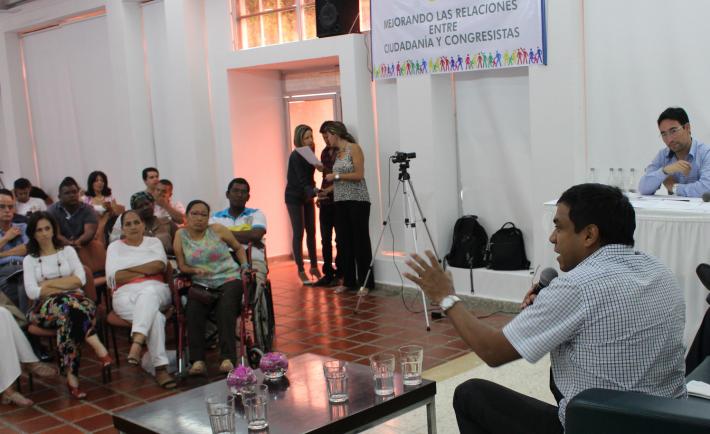
Citizens and congressmen meet in the department of Bolivar, Colombia to discuss issues and improving relations.
Each week NDI’s Citizen Participation team provides a resource to assist NDI staff in meeting the objectives of their programs. This past month's resources described the need for integrative strategies for citizen-led accountability, outlined an assessment framework to identify government accountability gaps, introduced a learning and advocacy framework for disability-inclusive development, and convened resources on cross-sectoral and evidence-based approaches to positive youth development. These resources provide tools and insights that can help citizens and civil society strengthen their ability to increase government accountability and bring about inclusive developmental change.
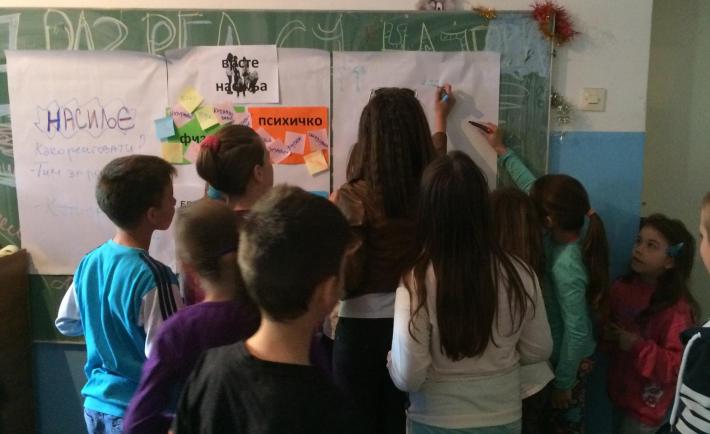
Students in Zvecan, Kosovo, brainstorm ways to stop school bullying, as part of a community initiative started by YLP participants.
Vladimir had not crossed the Mitrovica bridge -- which divides ethnic Serb communities north of the Ibar River from ethnic Albanians to the south -- in three years. But in February last year, Vladimir had a reason to cross the bridge and travel south: the opportunity to attend an NDI training in Gracanica with 19 other minority youth leaders and become a stronger advocate for issues in his community. Vladimir and his colleagues are members of the most recent generation of NDI’s Youth Leadership Program.
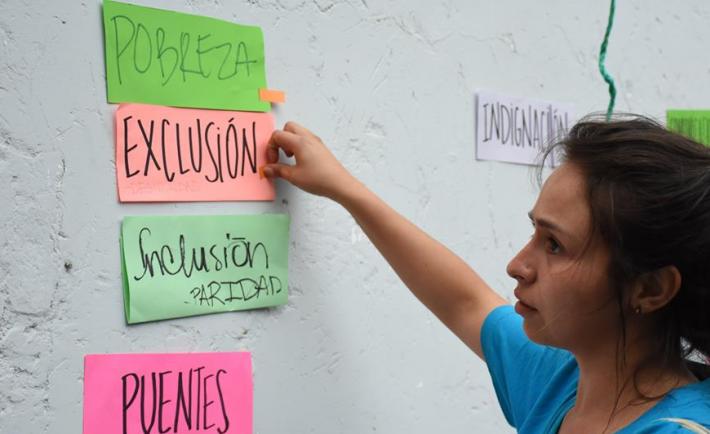
A young Guatemalan woman participates in an activity organized by civil society to reflect on the political crisis and future priorities. Credit: Pamela Saravia
As this blog series has highlighted, the 2015 Guatemalan elections were unique in many regards. Citizen protests resulted in the resignation and arrest of the president and vice president on corruption charges. Voter turnout was the highest since the return to democracy in Guatemala. The presumptive winner, the runner-up in elections four years earlier who was leading in the polls, failed to make it to the second round. And electoral violence was lower than expected and lower than during recent electoral processes. The question then becomes, what’s next for Guatemala?
Ordinary citizens and civic organizations become tremendously more active in the community immediately after a tragedy hits their community. This was my experience with my community in Kosovo in the post-war reconstruction in the late 90’s and this has certainly been the case in Nepal after two mega earthquakes last year took close to 9,000 lives, injured more than 22,000 people and destroyed more than 600,000 homes. Nepalis in solidarity with their fellow citizens flocked to help with relief materials, building shelters and reinforcing other people’s homes. The spirit of the community was very high.
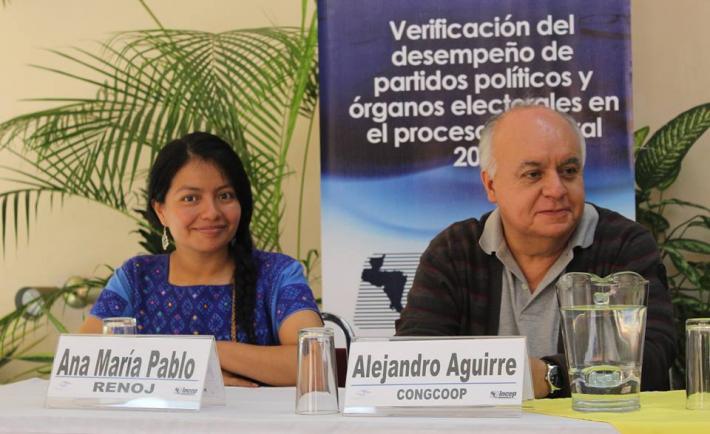
Anixh Ana María Pablo Tercero prepares to present election observation results at a press conference.
Large numbers of Guatemalan citizens are excluded from political life. Indigenous communities are among the most marginalized, as they face both institutional and cultural barriers in the country’s political system. Since the 2006 electoral reforms and during the subsequent three elections, Guatemala has seen important steps forward in terms of increased political participation; however, challenges remain in translating participation into meaningful representation.